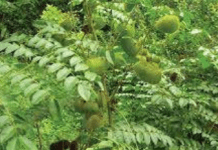
Salvadora persica Linn. is a large, well-branched evergreen shrub commonly known as the toothbrush tree, the mustard tree, or the salt brush tree. Its seeds are popularly referred to as miracle seeds. In Hausa, it is called ashuwaki.
Constituents
Phytochemical investigations of various parts of Salvadora persica have revealed the presence of different classes of secondary metabolites, including alkaloids, flavonoids, glycosides, sterols, terpenes, tannins, carbohydrates, and proteins. Organic sulphur-containing compounds and elemental sulphur are also present, along with lauric acid, palmitic acid, trimethylamine, sitosterol, and myristic acid. The plant also contains fluoride and calcium.
Preparations
The main parts used for medicinal purposes include the bark, fruit, seed, and root bark. Fresh leaves may be ground into a paste. The leaves, bark, and roots can be used as decoctions. The plant is also available in various forms, including toothbrushes, fresh leaves, flowers, and fresh and dried berries.
Pharmacological actions and medicinal uses
Modern research has reported various pharmacological activities for Salvadora persica, including antimicrobial, antifungal, anti-inflammatory, analgesic, antiulcer, anticonvulsant, sedative, antifertility, wound-healing, anthelmintic, antidepressant, lipid-lowering, anticancer, carminative, and diuretic properties.
These properties inform its use in the management of several health conditions, such as dental caries, snake bites, dysmenorrhoea, constipation, skin diseases (ringworm, eczema), rheumatism, and respiratory issues (sinusitis, colds, flu, rhinitis, and coughs). A paste made from the leaves is used to treat piles, boost fertility and ovulation, increase the chances of conception, and enhance sperm production. The leaves also aid weight loss and exhibit antibacterial and antifungal properties. When consumed on an empty stomach, the leaves of S. persica help digestion due to their astringent properties.
Additionally, S. persica helps fight plaque, combats gum disease, prevents the progression of existing tooth decay, and strengthens tooth enamel. Researchers have also reported that consuming Salvadora persica plant extract for 28 days led to a significant decrease in blood sugar levels and an increase in fat reduction. The small, fragrant flowers are used as a stimulant and are mildly purgative.
Adverse effects
The seeds of Salvadora persica (miswak) may have adverse effects on the reproductive system and fertility. In males, it may cause increased weight of the testes and preputial glands, along with a decrease in the weight of the seminal vesicles. In females, it may lead to decreased progesterone levels.
Economic uses and potentials
Salvadora persica is traditionally used as a source of food, cosmetics, fuel, and medicine. The wood is suitable for charcoal and firewood production. In Namibia, the mustard bush serves as a drought-resistant fodder for cattle. In Lagos, 50 seeds of S. persica cost approximately ₦152,000.
References
Eshemokha U. (2022). Side effects and health benefits of persica. Retrieved from: https://nimedhealth.com.ng/2022/12/31/side-effects-and-health-benefits-of-persica-seed/. on 17th January, 2025.
By Pharm. Ngozika Okoye MSc, MPH, FPCPharm
(Nigeria Natural Medicine Development Agency)
Email: ngozikaokoye@yahoo.com










